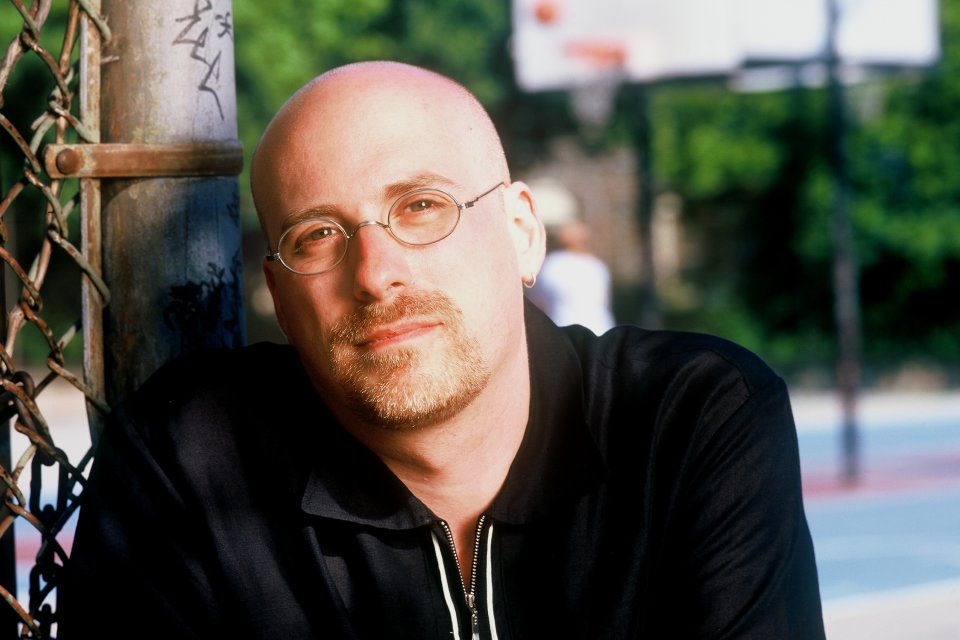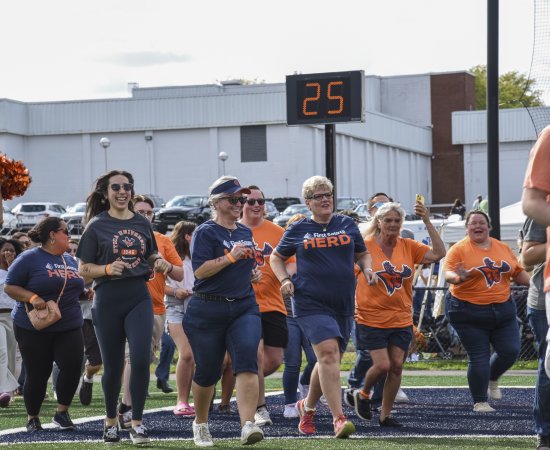
A Conversation with Larry Platt ’87, Producer of the Most-Watched Documentary Ever in the U.S.

"I don't think any of us thought it would be received the way it was."
Larry Platt ’87 is a producer of “Kelce,” the Emmy Award-winning documentary about Philadelphia Eagles star Jason Kelce and his struggle with the decision of whether to retire from professional football. The film premiered on September 12 and had the biggest first three days ever for a documentary film in the U.S.
A Philadelphia media fixture since the early 1990s, Platt is co-executive director of the Philadelphia Citizen, the nonprofit, solutions-oriented civic news organization he co-founded in 2015. That same year, Platt authored with ESPN sportscaster Stuart Scott the New York Times bestseller Every Day I Fight, a memoir of the late Scott’s cancer fight. He is the author of several other acclaimed books, most involving professional sports figures, and his work has been published in New York Times Magazine, GQ, and Men’s Journal, among other national publications
Utica Magazine recently sat down with Platt to discuss “Kelce,” its incredible reception, and his foray into documentary film.
Utica Magazine: “Kelce” is Prime Video’s most-watched documentary ever in the U.S. To what do your attribute the film’s incredible reception? Has its success surprised you?
Larry Platt: I don't think any of us thought it would be received the way it was. First and foremost, the film works because in an age of pre-packaged celebrity, Jason and, especially, his wife, Kylie, are so very real. There’s no artifice with either of them. Over something like two years, they just let a camera crew embed in their lives. That takes a courage and a comfort in one’s own skin that is increasingly rare. And that gets to the other reason I think the film went viral – the husband and wife directing/producing team of Don Argott and Sheena Joyce. Don is a cinematographer with a great eye and the look of the film is more creative than the typical sports doc. Sheena’s very real relationship with Kylie – who was initially not interested in being on-camera – was key to getting the subjects to forget that a camera crew was capturing their every move.
UM: Much of your career has been in print media and, more recently, digital publishing. How did this project, and your involvement in it, come to be?
LP: I had produced a previous little-watched documentary called “We Town” that Sports Illustrated bought. Jason and executive producer (and former Eagle) Connor Barwin came to me and said they wanted to do a doc that chronicles an athlete handling retirement. A few years back, I’d done a long feature (article) for Sports Illustrated on that very topic, called “Life After The Game.” Jason, Connor, and I had dinner, I mapped out for them the process, and we agreed to partner on this project – and we were off. The first step was hiring a director. We interviewed filmmakers and found Don and Sheena.
The project started as a chronicle of a 35-year-old world-class athlete facing the end – confronting losing the only thing that had ever given him any sense of personal identity. As the Eagles’ magical season culminating in a Super Bowl loss went on, that thesis morphed into more of a straight-ahead football narrative, but the theme of Jason’s impending decision to play or not to play remained and gave the story some added emotional weight.

UM: As a storyteller, what is it about Jason Kelce’s story that captivated you?
LP: Initially, I was intrigued by the subject – a deep dive into the very weird phenomenon of athlete retirement. Who else retires at 35? But then as I got to know Jason, I found a terrific character – he's so curious and introspective and readily emotional. Quickly, I became convinced that he was leading man material, which is to say, a protagonist that others – football fans or not – would want to root for on a very personal level.
UM: The city of Philadelphia is often characterized – and sometimes criticized – as a tough and excessively spirited sports town. Yet, it is a city that also embraces its sports heroes, many of whose relationships with the city you’ve written about. What did you find so unique about Jason Kelce’s connection with the city?
LP: I've had the great good fortune of chronicling arguably the two most popular and fan-friendly athletes in Philadelphia history: Allen Iverson and Jason Kelce. And while they would seem to be very different, I think it’s their similarities that endear them to the Philly sports fan. They’re both warriors, underdogs, guys who used the doubts of others as their fuel to greatness. Philadelphia – which lost being the financial capital of America to New York and serving as the political capital of the nation to D.C. – still has the same type of chip on its shoulder. There are some athletes who can’t cut it in Philly – way back in the '80s, all-star catcher Lance Parrish crumbled under fan critique – but guys like Iverson and Kelce, in their toughness and raw humanity, are tailor made to succeed here.
UM: You’ve often examined the intersection between sports and culture. What spurred your passion for that topic? To what extent does Jason Kelce’s story transcend sports?
LP: When you think of it, cities make no logical sense. Let’s take all these people, from all different backgrounds, and have them basically live on top of one another: What could go wrong? Well, it turns out that one of the ways we take that hodge podge of humanity and turn it into the e pluribus unum creed is through our games. Sports just may be our last mass communitarian shared value. I’ve seen white Republicans in Armani suits high-fiving Black hip-hoppers upon an Iverson crossover, and blue collar truck drivers and women from tiny Bryn Mawr College crying together upon Jason Kelce’s emotional farewell speech. We don't have much that brings us together anymore, as so many of our institutions have crumbled under our recent political and cultural divisions. But when I’m at a Sixers or Eagles game, my neighbors and I are still united in common purpose – that's a much needed feeling these days.
More Stories

Defending the Freedom to Read – Utica University joins in Banned Books Week
"Books and ideas are the most effective weapons against intolerance and ignorance." ― President Lyndon B Johnson From books banned...

Welcome Home Weekend
After several days of rain, the skies parted as if on schedule, bringing sunshine and warm temperatures just as thousands...

Full-Tuition Scholarships Available to Career-Changers Wishing to Transition into K-12 Teaching Careers
Utica University’s Educator Preparation Program is addressing the growing teacher shortage through major financial incentives to enroll. Ten full-tuition scholarships...
I would like to see logins and resources for:
For a general list of frequently used logins, you can also visit our logins page.
